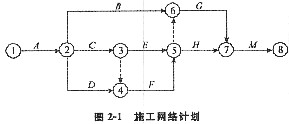问题
问答题
某工程,业主在招标文件中规定:工期T(周)不得超过80周,也不应短于60周。
某施工单位决定参与该工程的投标。在基本确定技术方案后,为提高竞争能力,对其中某技术措施拟定了三个方案进行比选。方案一的费用为C1=100+4T;方案二的费用为C2=150+3T;方案三的费用为C3=250+2T。
这种技术措施的三个比选方案对施工网络计划的关键线路均没有影响。各关键工作可压缩的时间及相应增加的费用见表2-1。

如果该工程的施工网络计划如图2—1所示,则压缩哪些关键工作可能改变关键线路压缩哪些关键工作不会改变关键线路?
答案
参考答案:
压缩关键工作C、E、H可能改变关键线路,压缩关键工作A、M不会改变关键线路。
